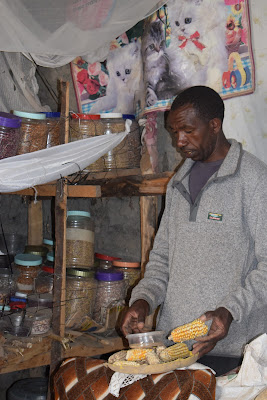How a goat farming project helped lift women groups in Kitui Central out of poverty. BY FELISTA WANGARI
When the 2019 national census was conducted, nearly half of the residents of Kitui were found to be living in poverty. A just over a decade prior, the women of Kwa Ukungu and Kwa Nginda say that was them.
At Kalumu Malombe’s homestead in Kwa Ukungu, Kambua John recalls being so poor that drinking milk tea was a fantasy.
“We had nothing. We were chosen from the poor of the poor … goat farming has transformed our lives,” says Ms John.
Their
fortunes began to change in 2005, when the local assistant chief asked them to
form two groups of 25 women, who would then be trained on dairy goat farming
and be given a starter stock of three galla she-goats each. Each group was also
given an exotic Toggenburg buck for cross-breeding with the local
drought-resilient she-goats that could produce hybrid offspring to provide
milk, meat and a livelihood.
The two groups were part of the larger Kitui Mwingi Breeders Association, which was supported by Farm Afrika, an organisation that seeks to boost the harvests and incomes of smallholder farmers, to lift them out of poverty.
The goats had to be cross-bred and bear kids twice before the required hybrid was achieved. The first two rounds of offspring were sold at Sh8,000 per goat, but once the required mix was achieved, the goats fetched higher prices with the third crossbred offspring fetching Sh13,000 a goat. The local goats in contrast, would sell for Sh3,000 on average, depending on the season. The pure Toggenburg breeds were sold at Sh28,000 per goat, but they couldn’t withstand the climatic conditions of Kitui Central, and died off. The hybrids were better adapted to the climate.
Margaret remembers selling three goats at Sh15,000 each and getting Sh45,000 as a result.
“I had never handled that kind of money. I couldn’t believe it was my money. I used it to clear a school fees balance of Sh15,000, bought chairs for my house and two large sufurias, so that I wouldn’t have to borrow whenever I had guests,” she says, adding that goat farming has helped them climb out of poverty.
Making changes
With their improved income, the women made changes to their chama (informal savings group), and turned it into a table banking group instead. With table banking, they now have access to credit to buy farm inputs like fertiliser and feed like napier grass, if the rains fail and there is insufficient feed on their farms.
“Before, we didn’t have access to money, so we would contribute Sh50 and give the money to one person in rotation. We didn’t achieve much with that. Now a member can get a Sh20,000 loan for school fees,” says Ms Mwende.
Rebecca Kasikali, the chairlady of the Kwa Nginda group, adds that improved income reduced their financial dependency.
“We used to wait for our husbands to bring money home. If they got nothing, we would sleep hungry,” says Ms Kasikali, adding that goat farming taught them how to make a living through selling milk and meat.
The
group’s buck also earned them money, as those who brought their goats would pay
Sh50 for crossbreeding services. Currently, those with bucks charge Sh200 for
the services.
The proceeds from goat farming have also seen some of the women start other small businesses in addition to farming. Ms Mwende and Ms John, run a grocery shop and a cafe at the local shopping centre, respectively.
“We used to struggle to find income as casual labourers on other people’s farms; but now we are business women and we can afford to employ people to help on our farms. The goats uplifted us,” says Ms Mwende.
Goat farming in Kitui in numbers
-
87% of rural
household income in Kitui is generated from agriculture, which is the main
economic activity
-
82% of
households involved in farming keep livestock
-
69% of
farmers rear goats, keeping an average of 5
goats per household
This feature is supported by a grant from WAN-IFRA’s Women in News
Social Impact Reporting Initiative on Climate Change













